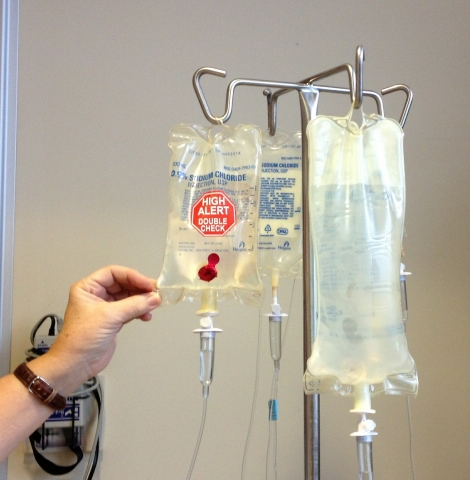
Cehmotherapy is bcoming more commonplace, and it's imporarant that practices ensure they are ensuring safety of staff, pets and clients
Stay Safe! Addressing The Hazards Of Chemotherapy Administration
Stay Safe!
The administration of cytoxic drugs in practice is a potential hazard to staff and clients.
This short informative article is provided by ONCORE tutor and VTS (Oncology) nurse Linda Ryan, and offers a reminder of the importance of safety vigilance when administering cytotoxic drugs to patients, to ensure your practice, staff and clients stay out of harm's way.
Advances in veterinary oncology makes chemotherapy more commonplace
Cancer is a major cause of death in older dogs and cats. Despite this, there are a number of treatments available, including chemotherapy, to offer pets a good quality of life. Advances in veterinary oncology have increased owner awareness and the readiness of many veterinary practitioners to treat cancer patients, meaning that greater numbers of pets with cancer are being managed long-term. With this use comes potentially serious risk of long or short-term harm to staff & owners, including increased chromosomal alterations, hepatotoxicity and abnormal reproductive outcomes to be associated with exposure to various chemotherapeutic drugs; as well as to patients.
General and referral practice
Chemotherapy is now commonly being used in general & referral practice in a variety of ways, e.g. as an adjunct to surgery and/or radiotherapy and/or other modalities, in the treatment of solid tumours, to control microscopic/metastatic disease, with curative or palliative intent. Clinics may have sole care of the patient, or may be care-sharing with a referral or first opinion practice, depending on the situation. Whatever the protocol, the goal of therapy being maintenance of optimum quality of life.
A real risk for patients, staff members and pet owners
Whilst the use of chemotherapy agents is a mainstay of treatment of patients with cancer, due to their cytotoxic nature, they pose a real risk for patients, staff members and to pet owners, therefore care is required when handling and administering them, and in the day-to-day care of patients which have received these drugs. For the human caregivers, care is vital as they are potentially carcinogenic (cancer causing), mutagenic (damaging to DNA) and teratogenic (damaging to unborn foetuses). They are irritant to the skin and mucous membranes.
Talking to clients about chemotherapy so that they know what to realistically expect
In human cancer therapy, chemotherapy is often aggressive, with severe debilitating side effects, therefore many owners’ first reaction to chemotherapy is “I don’t want to put my pet through that” - educated veterinary nurses are perfectly placed to discussed the facts & allow informed choice, ensuring that adequate time is spent with owners to counsel them on what to realistically expect during their pet’s chemotherapy. In some cases periodic chemotherapy will be necessary to control the cancer for the rest of the pet’s life, meaning potentially prolonged exposure, making careful protective measures vital. There must also be written instructions to pet owners for at-home administration, handling of drugs and for dealing with drug-contaminated excreta.
These drugs are not selective!
Patients may have adverse effects too. Although in skilled hands, the beneficial effects of chemotherapy against cancer generally outweigh the potential side effects, almost all anticancer drugs have side effects, as these drugs are not selective in their effect on growing or dividing cells; therefore they commonly affect body systems which include those with rapidly dividing cells. Toxicities may manifest at any time during chemotherapy treatment - with some having immediate effect, and others being acute or per-acute. Many are transient and are managed symptomatically; whilst others are irreversible.
For all of these reasons, a knowledgeable team is vital, & it is important that written safety protocols be established and followed in the any veterinar
y clinic administering chemotherapy, and that cytotoxic drug products are handled with extreme caution and awareness of their potential danger.
If guidelines are followed there is minimal risk to staff and pet owners
Veterinary nurses have a vital role to play in the care of chemotherapy patients and in maintaining the health and safety of both patient, client and staff. Careful administration of cytotoxics drugs and subsequent patient monitoring should avoid many potential complications of using these drugs.
If guidelines are followed, the safe use of cytotoxic drugs should be possible for the majority of veterinary practices, with minimal risk to all staff and clients involved.
Practices and personnel should always keep the risks of cytotoxic drug use at the forefront of their minds, with regular risk assessments and updates to best working practices being performed.
Linda Ryan, DipAVN (Medical) VTS (Oncology) RVN
If you would like to learn more about chemotherapy safety and the role you can play in its implementation, you may find our course useful:
http://www.oncoreepd.co.uk/Veterinary-Oncology-Safe-use-of-chemotherapy-in-practice
Visit ONCORE's newsroom:
http://www.oncoreepd.co.uk/Newsroom
More from ONCORE ePD
- Publication of the first client communication guide for veterinary nurses
- WE MUST CONSIDER DOGS TOO, WHEN WE IMPLEMENT LOW STRESS HANDLING
- ONCORE teams up with Jenny Moffett to transform practice outlook on well-being
- Vicky Ford-Fennah is new tutor for ONCORE
- New Course To Help Vets With The Medical Options For Cancer Patients

 7 years ago
7 years ago  2725 views
2725 views
